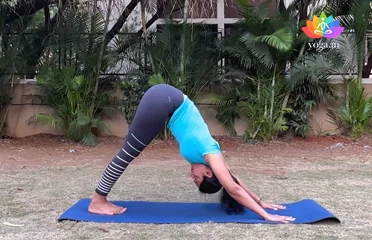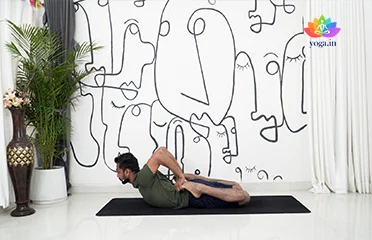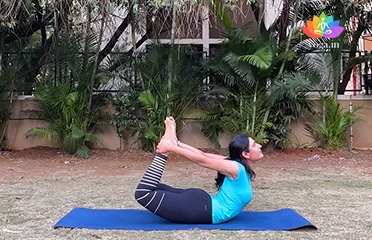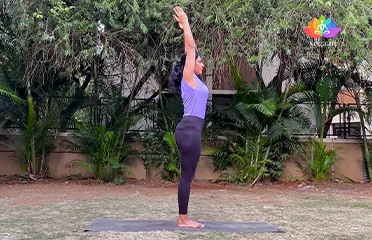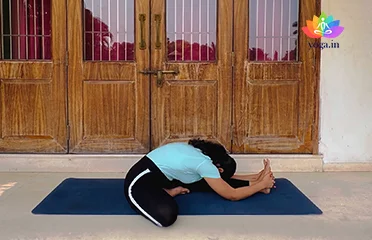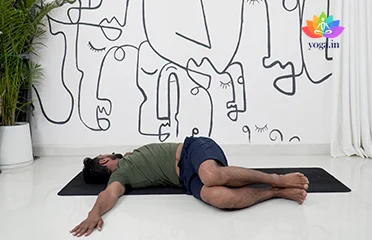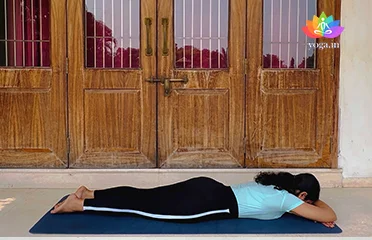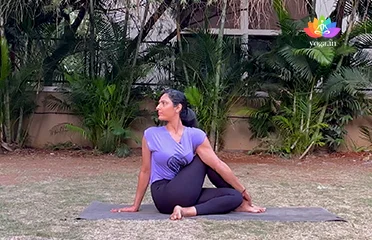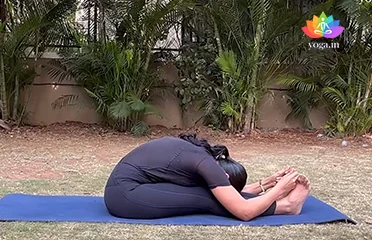Adho Mukha Svanasana (Downward-Facing Do
अधोमुख श्वानासन / Downward-Facing Dog Pose
The sanskrit name is derived from adhas (अधस्) meaning down, mukha [�K]
Bhekasana (Frog Pose II)
भेकासन / Frog Pose II
The Sanskrit name is derived from Bheka (भेका) meaning frog and asana [�K]
Dhanurasana (Bow Pose)
धनुरासन / Bow Pose
The Sanskrit name is derived from Dhanur (धनुर) means bow and Asana [�K]
Hastapadasana (Hand to Foot Pose)
हस्तपदासन / Hand to Foot Pose
The sanskrit name is derived from hasta (हस्त) means hands, pada (पदा) [�K]
Janusirsasana (Head to Knee Pose)
जानुशीर्षासन / Head to Knee Pose
The Sanskrit name is derived from (जानु) Janu means knee, Sirsa (शीर्षा) [�K]
Jathara Parivartanasana (The Abdominal T
ञठर परिवर्तनासन / The Abdominal Twist
The Sanskrit name is derived from Jathara (ञठर) meaning belly or abdomen, [�K]
Makarasana (Crocodile Pose)
मकरासन / Crocodile Pose
The Sanskrit name is derived from Makara (मकरा) meaning crocodile and [�K]
Matsyendrasana (Lord of the Fishes Pose)
मत्स्येन्द्रासन / Lord of the Fishes Pose
The name Matsyendrasana is derived from the Sanskrit words Matsya (मत्स्य) [�K]
Naukasana (Boat Pose)
नौकासन / Boat Pose
The Sanskrit name is derived from Nava ( नाव) meaning boat and asana (आसन) [�K]
Paschimottanasana (Seated Forward Bend)
पश्चिमोत्तानासन / Seated Forward Bend
The Sanskrit name is derived from three sanskrit words: Paschima (पश्चिमा) [�K]
- 1
- 2
How Yoga Can Help Cure Colitis:
Colitis is an inflammation of the colon that can cause pain and discomfort. Yoga can play a significant role in managing and alleviating the symptoms of colitis. Through specific postures, breathing exercises, and relaxation techniques, yoga can promote digestive health, reduce stress, and help soothe the colon.
Understanding Colitis:
Colitis is a condition characterized by inflammation of the colon (large intestine). It can be acute (sudden onset) or chronic (long-lasting). Common types of colitis include ulcerative colitis, Crohn’s colitis, and infectious colitis. This inflammation can lead to symptoms like abdominal pain, diarrhea, and fatigue, making daily life challenging.
Yoga’s Role in Relieving Colitis:
Specific yoga practices can help alleviate the symptoms of colitis by enhancing digestion, reducing stress, and promoting overall well-being. These include gentle asanas (postures) that stimulate the digestive system, pranayama (breathing exercises) that calm the mind and body, and meditation techniques that reduce stress and promote healing.
Key Factors Contributing to Colitis:
Several factors can contribute to the development of colitis, including:
- Genetic Predisposition: A family history of colitis increases the risk.
- Immune System Response: Abnormal immune responses can trigger inflammation.
- Infections: Bacterial, viral, or parasitic infections can cause colitis.
- Diet and Lifestyle: Poor diet and lifestyle choices can exacerbate symptoms.
- Stress: Chronic stress can negatively impact gut health.
Symptoms of Colitis:
Common symptoms of colitis include:
- Abdominal Pain: Persistent pain or cramping in the lower abdomen.
- Diarrhea: Frequent, loose, or watery stools.
- Blood in Stool: Presence of blood or mucus in bowel movements.
- Urgency to Defecate: A sudden and strong urge to have a bowel movement.
- Fatigue: Constant feeling of tiredness and lack of energy.
- Weight Loss: Unintended weight loss due to decreased appetite or malabsorption.
- Fever: Occasional fever indicating inflammation or infection.
Treatment of Colitis through Yoga and Pranayama:
Yoga and pranayama can be highly effective in managing colitis. Some beneficial practices include:
Specific Yoga Poses:
- Pawanmuktasana (Wind-Relieving Pose): Helps release gas and improve digestion.
- Balasana (Child’s Pose): Provides gentle compression to the abdomen, promoting relaxation.
Pranayama Exercises:
- Anulom Vilom (Alternate Nostril Breathing): Balances the mind and reduces stress.
- Bhramari (Bee Breath): Calms the mind and reduces stress levels.
Diet for Colitis:
A balanced diet can help manage colitis. Recommendations include:
- Probiotic-Rich Foods: Yogurt, kefir, and sauerkraut support gut health.
- Fiber-Rich Foods: Fruits, vegetables, and whole grains aid digestion.
- Lean Proteins: Chicken, fish, and tofu provide essential nutrients.
- Anti-Inflammatory Foods: Ginger, turmeric, and green leafy vegetables reduce inflammation.
- Hydration: Drink plenty of water to stay hydrated and support digestion.
Caution for Colitis:
While practicing yoga for colitis, it is essential to:
- Avoid Overexertion: Practice at a gentle pace to prevent strain on the abdomen.
- Be Mindful of Pain: Stop immediately if any pose causes discomfort or pain.
Always consult with a healthcare provider before starting any new exercise regimen, especially if you have severe colitis.
Contraindications for Colitis:
Individuals with severe colitis or significant abdominal pain should:
- Avoid Intense Yoga Practices: Vigorous exercises might exacerbate symptoms.
- Steer Clear of Certain Poses: Inversions and poses that compress the abdomen may increase discomfort.
- Seek Professional Guidance: Consult a yoga therapist or healthcare professional for personalized recommendations.


